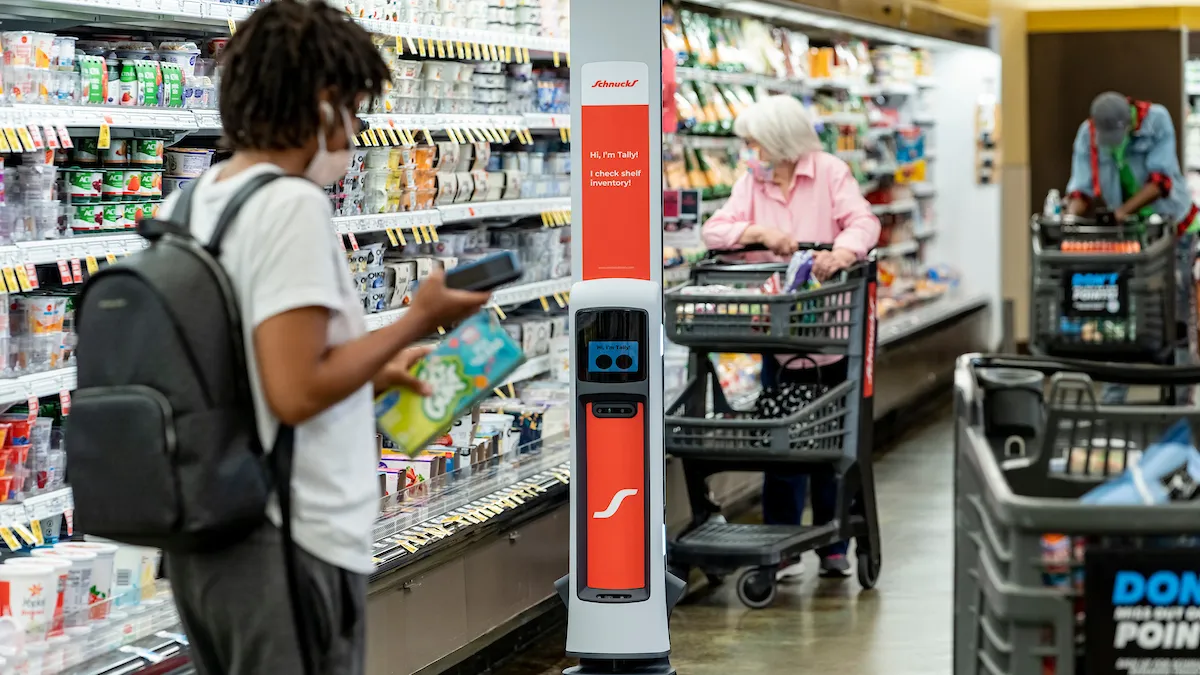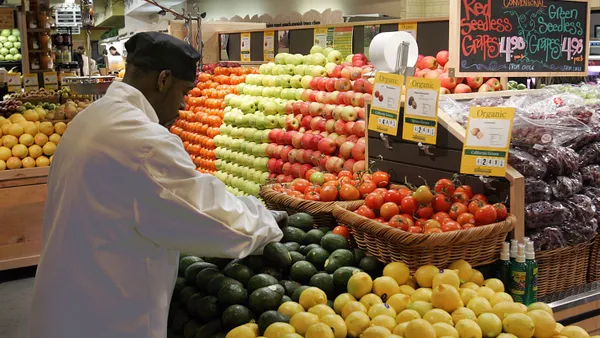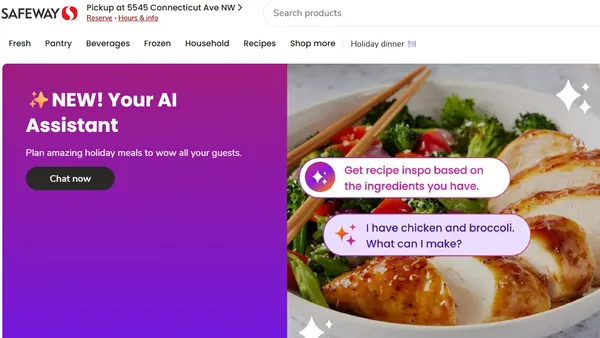Dive Brief:
- Schnuck Markets announced on Thursday the deployment of automated aisle-scanning equipment chainwide, building on a project that began in 2017 and grew to more than half of the retailer's fleet last September.
- The retailer decided to expand its use of the robots, provided by Simbe Robotics, to all of its 111 stores after concluding that the devices would be as effective in lower-volume stores as they have been in busier locations, said Dave Steck, vice president of IT infrastructure and application development for Schnucks.
- Schnucks is starting to use the robots to monitor fresh and refrigerated products after initially relying on them only to record levels of dry goods on store shelves.
Dive Insight:
When Schnucks first decided to give Simbe's rolling inventory-management devices a try, the grocer limited their use to a handful of stores as it compared the robots' skills with the ability of its workers to track product levels and flag out-of-stock items.
The grocer quickly discovered that the robots were much better suited than humans at performing the tedious task of watching product levels. Schnucks found that the camera-equipped devices, known as "Tally," are between four and 15 times more efficient than people at identifying when products sell out and realized that it would be better off assigning staff to other roles, like working with customers and restocking shelves, according to Steck.
"[Tally] has given us insights into the stores that we've never had before. It's giving us opportunities to find other places in the supply chain that we thought were working, and it's putting the product on the shelves for the customer, which is really the primary goal," he said.
Steck added that human labor costs did not factor into the decision to expand the robot deployment chainwide. "When we went forward with the request to bring in more robots, we did not include labor savings, because our labor is busy as it is," he said. "Store operations [said] give me more robots, and they want Simbe to put arms on them so they can stock the shelves for them."
Schnucks has assigned one Tally robot to each of its stores, Steck said, adding that the deployment includes the smaller-format, fresh-focused location it opened last week in Jasper, Indiana. Each robot can traverse a store's aisles at least two times per day, with a third trip possible if staff members are not working overnight to stock shelves.
The robots' speed and accuracy have helped Schnucks respond far more rapidly to hiccups in its supply chain than it could in the past. "If the warehouse was supposed to pick two cases and they only picked one case, then they're off by a case, and we may not know about that immediately. But when Tally sees that we're off, then the store teams can adjust that perpetual inventory number back to zero very quickly, whereas it would take weeks for that to be noticed and adjusted in the old way," Steck said.
Schnucks is currently using the data the Tally robots provide to give it visibility into products it distributes itself, but hopes eventually to begin work with vendors that make deliveries directly to stores to speed up its ability to deal with out-of-stocks, Steck said.
The newest iteration of Tally, which Simbe unveiled last year, is able to scan a wider array of items and deal with more challenging lighting conditions than earlier versions of the autonomous device, said Brad Bogolea, co-founder and CEO of the San Francisco-based robotics company. The upgraded device, called Tally 3.0, can record levels of items in freezers and coolers in addition to the dry goods the earlier robots were intended to deal with, he said.
Schnucks is using the latest version of Tally in the stores it is now equipping with the robots, and the upgraded technology will eventually make its way to all of the grocer's stores, Bogolea said.
Steck said Schnucks is planning to use the improved robots to track items in sections like dairy, produce and meat that it hadn't been able to scan automatically before. "We're getting some confidence to see through glass and get that accurate," he said.
In addition to Schnucks, Simbe is working with grocers including Save Mart and Giant Eagle to put Tally through its paces. The venture capital-backed company, which has so far raised almost $30 million, is also working with retailers outside the United States and expects to make further announcements about companies that are using its equipment in the coming months, Bogolea said.











